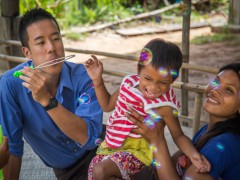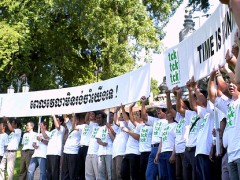-

Anti-Founder takes Speech Therapy to the UN in Cambodia
Weh Yeoh is the founder of a project tackling extremely common communication and swallowing disorders in Cambodia, but to be frank, Weh rejects the trophy title and instead considers himself more of an ‘anti-founder’. “We’ve all seen founder’s syndrome – or founderitis – at play. Everyone remembers the Steve Jobs, the […]
Read all posts for ‘Cambodia’
-

Cambodia: A Turning-point for Freedom of Expression?
This article responds to the Secrets of Transformation multimedia series, a joint project of Bertelsmann Transformation Index and Deutsche Welle. Freedom of expression has deteriorated in Cambodia even though it is guaranteed under international and Cambodian law. Cambodian citizens are regularly targeted, harassed, charged with criminal offenses and subject to politically motivated persecution for speaking […]
-

The effects of globalization on Cambodia
Judging by the socio-economic changes from the 1990s through to the present decade, the outcomes of globalization in Cambodia have been quite rapid and positive. Cambodia’s regional integration through the Association of South East Asian Nations (ASEAN) in 1999, and the World Trade Organization (WTO) in 2004 have spured on the globalization process. […]
-

Are NGOs in Cambodia Getting the Right Results?
This article was originally drafted by Rob Jamieson and Indochina Research for the newsletter “I-Light” as part of the Rockefeller Foundation’s Searchlight Process. For more Searchlight content on futurechallenges.org, please click here. Non-government organizations have been a major feature of Cambodian life for over two decades, having a profound influence on the county’s development. Yet Chum Samnang, […]
-

Cambodian Women and the Economy
A traditional Khmer saying “sartrey bangvil cheung kran min chum”, meaning women cannot do anything besides moving around the kitchen, seems no longer valid in contemporary Cambodian society, at least to a larger extent. A quick glance at some figures can show why this is so: around 65 percent of […]
